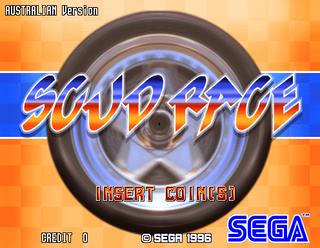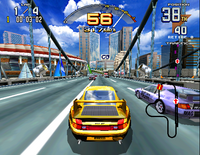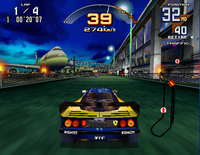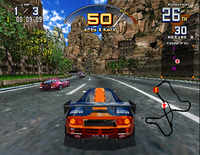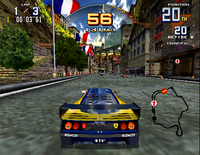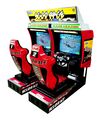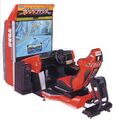Difference between revisions of "Scud Race"
From Sega Retro
m |
|||
| (28 intermediate revisions by 6 users not shown) | |||
| Line 2: | Line 2: | ||
| bobscreen=ScudRace Title.png | | bobscreen=ScudRace Title.png | ||
| publisher=[[Sega]] | | publisher=[[Sega]] | ||
| − | | developer=[[Sega AM2]] | + | | developer=[[Sega AM2]], [[Youmex]] |
| + | | licensor=[[Porsche]], [[Ferrari]], [[Dodge]], [[McLaren]] | ||
| system=[[Sega Model 3 Step 1.5]] | | system=[[Sega Model 3 Step 1.5]] | ||
| − | |||
| sounddriver= | | sounddriver= | ||
| peripherals= | | peripherals= | ||
| players=1-4 | | players=1-4 | ||
| genre=Racing | | genre=Racing | ||
| − | | releases={{ | + | | releases={{releasesArcade |
| − | | | + | | mod3_date_jp=1996-12{{fileref|Sega Arcade History JP EnterBrain Book-1.pdf|page=143}} |
| − | | | + | | mod3_date_us=199x |
| − | | | + | | mod3_date_uk=1997 |
| − | | | + | | mod3_date_au=199x |
}} | }} | ||
}} | }} | ||
| − | ''''' | + | '''''{{PAGENAME}}''''' (Sports Car Ultimate Drive Race), known in the United States as '''''Sega Super GT''''', is a [[Sega Model 3 Step 1.5]] arcade racing game developed by [[Sega AM2]] and manufactured by [[Sega]]. First released to Japanese arcades in December 1996, it is the spiritual sequel to the company's critically-acclaimed ''[[Daytona USA]]''. |
| − | + | Featuring a similar control scheme, HUD and visual style, ''Scud Race'' exchanges NASCAR-style stock cars for GT supercars. The core engine powering the game does not differ significantly from ''Daytona USA'' due to supposed time restraints - major improvements would not be seen in that area until ''[[Daytona USA 2: Battle on the Edge]]''. The game was released to demonstrate the capabilities of the Model 3 hardware, containing many bright, colourful and detailed stages rendered at fast speeds while retaining a 60FPS refresh rate. | |
==Gameplay== | ==Gameplay== | ||
| Line 28: | Line 28: | ||
===Cars=== | ===Cars=== | ||
| − | {{ | + | {{InfoTable|imagewidths=100| |
| − | {{ | + | {{InfoRow |
| − | | | + | | title=Porsche 911 GT2, "Easy Driving" |
| image=ScudRace_Porsche_Icon.png | | image=ScudRace_Porsche_Icon.png | ||
| desc=Top speed: 337km/h (AT), 344km/h (MT) | | desc=Top speed: 337km/h (AT), 344km/h (MT) | ||
| Line 36: | Line 36: | ||
The [[wikipedia:Porsche 911 GT2|Porsche 911 GT2]] (based on the [[wikipedia:Porsche 993|Porsche 993]] and considered to have been a lower class vhicle in the BPR) is the easy option in ''Scud Race'', being the simplest and safest car of the four to drive. It is, however, the slowest, and so is mainly aimed at beginners. | The [[wikipedia:Porsche 911 GT2|Porsche 911 GT2]] (based on the [[wikipedia:Porsche 993|Porsche 993]] and considered to have been a lower class vhicle in the BPR) is the easy option in ''Scud Race'', being the simplest and safest car of the four to drive. It is, however, the slowest, and so is mainly aimed at beginners. | ||
}} | }} | ||
| − | {{ | + | {{InfoRow |
| − | | | + | | title=Ferrari F40 GTE, "Normal Driving" |
| image=ScudRace Ferrari Icon.png | | image=ScudRace Ferrari Icon.png | ||
| desc=Top speed: 349km/h (AT), 359 km/h (MT) | | desc=Top speed: 349km/h (AT), 359 km/h (MT) | ||
| Line 45: | Line 45: | ||
As [[Sega AM2]]'s head [[Yu Suzuki]] was a fan of Ferraris, the Ferrari F40 has appeared in multiple Sega games, usually related to the ''OutRun'' series (though in its non-GT red colour scheme). It was seen in ''[[Turbo OutRun]]'', ''[[Battle OutRun]]'', ''[[OutRun Europa]]'' and ''[[OutRun 2]]''. | As [[Sega AM2]]'s head [[Yu Suzuki]] was a fan of Ferraris, the Ferrari F40 has appeared in multiple Sega games, usually related to the ''OutRun'' series (though in its non-GT red colour scheme). It was seen in ''[[Turbo OutRun]]'', ''[[Battle OutRun]]'', ''[[OutRun Europa]]'' and ''[[OutRun 2]]''. | ||
}} | }} | ||
| − | {{ | + | {{InfoRow |
| − | | | + | | title=Dodge Viper GTS-R, "High Torque" |
| image=ScudRace Dodge Icon.png | | image=ScudRace Dodge Icon.png | ||
| desc=Top speed: 338km/h (AT), 349km/h (MT) | | desc=Top speed: 338km/h (AT), 349km/h (MT) | ||
| Line 52: | Line 52: | ||
Though a bit slower than the F40, the [[wikipedia:Chrysler Viper GTS-R|Dodge Viper GTS-R]] is an easier car to control and very good with corners. | Though a bit slower than the F40, the [[wikipedia:Chrysler Viper GTS-R|Dodge Viper GTS-R]] is an easier car to control and very good with corners. | ||
}} | }} | ||
| − | {{ | + | {{InfoRow |
| − | | | + | | title=McLaren F1 GTR, "High Speed" |
| image=ScudRace McLaren Icon.png | | image=ScudRace McLaren Icon.png | ||
| desc=Top speed: 355km/h (AT), 369km/h (MT) | | desc=Top speed: 355km/h (AT), 369km/h (MT) | ||
| Line 59: | Line 59: | ||
At the time, the [[wikipedia:McLaren F1 GTR|McLaren F1 GTR]] was the fastest road car available to the general public and the winner of the BPR, so it makes sense that it is also the fasest in ''Scud Race''. However, the speed comes at a cost - the car is much more difficult to control than the others. | At the time, the [[wikipedia:McLaren F1 GTR|McLaren F1 GTR]] was the fastest road car available to the general public and the winner of the BPR, so it makes sense that it is also the fasest in ''Scud Race''. However, the speed comes at a cost - the car is much more difficult to control than the others. | ||
}} | }} | ||
| − | + | }} | |
===Tracks=== | ===Tracks=== | ||
According to promotional material, every track in ''Scud Race'' is located in the fictional world of "Versus City", potentially named after one of Sega's multi-purpose arcade cabinets available at the time. | According to promotional material, every track in ''Scud Race'' is located in the fictional world of "Versus City", potentially named after one of Sega's multi-purpose arcade cabinets available at the time. | ||
| − | {{ | + | {{InfoTable|imagewidths=200| |
| − | {{ | + | {{InfoRow |
| − | | | + | | title=Beginner (Day)/Dolphin Tunnel |
| − | | | + | | screenshot=ScudRace BeginnerDay.png |
| desc=''Fast-paced race through the international marine exposition at Versus City.'' | | desc=''Fast-paced race through the international marine exposition at Versus City.'' | ||
| Line 73: | Line 73: | ||
There is also a tower preceding a bridge with a rotating [[Sega Saturn]] logo, as well as a poster showing [[Sonic the Hedgehog]] and [[sonic:Miles "Tails" Prower|Miles "Tails" Prower]] driving what seems to be a Ferrari F40. | There is also a tower preceding a bridge with a rotating [[Sega Saturn]] logo, as well as a poster showing [[Sonic the Hedgehog]] and [[sonic:Miles "Tails" Prower|Miles "Tails" Prower]] driving what seems to be a Ferrari F40. | ||
}} | }} | ||
| − | {{ | + | {{InfoRow |
| − | | | + | | title=Beginner (Night)/Twilight Airport |
| − | | | + | | screenshot=ScudRace BeginnerNight.png |
| desc=''Night driving through the Versus City raceway at speeds of 330km/hour!'' | | desc=''Night driving through the Versus City raceway at speeds of 330km/hour!'' | ||
Beginner (Night), also known as Twilight Airport, is also an easy track. This one takes place around an airport. The two beginner stages have rolling starts, similar to ''Daytona USA''. | Beginner (Night), also known as Twilight Airport, is also an easy track. This one takes place around an airport. The two beginner stages have rolling starts, similar to ''Daytona USA''. | ||
}} | }} | ||
| − | {{ | + | {{InfoRow |
| − | | | + | | title=Medum/Mystic Ruins |
| − | | | + | | screenshot=ScudRace Medium.png |
| desc=''Fiery race through ancient ruins located in the mountains of Versus City.'' | | desc=''Fiery race through ancient ruins located in the mountains of Versus City.'' | ||
Medium, also known as Mystery Ruins, is a more challenging track which requires more use of the drift mechanic. It is set in an Aztec ruin-esque mountainous region with several foggy segments. There are only 30 racers on this track by default and there are only three laps. | Medium, also known as Mystery Ruins, is a more challenging track which requires more use of the drift mechanic. It is set in an Aztec ruin-esque mountainous region with several foggy segments. There are only 30 racers on this track by default and there are only three laps. | ||
}} | }} | ||
| − | {{ | + | {{InfoRow |
| − | | | + | | title=Expert/Classic Castle |
| − | | | + | | screenshot=ScudRace Expert.png |
| desc=''The traditional race held in the hills of Versus City, where player drivers through detailed castle scenes and in a colliseum.'' | | desc=''The traditional race held in the hills of Versus City, where player drivers through detailed castle scenes and in a colliseum.'' | ||
| Line 96: | Line 96: | ||
Only 20 racers are on this track at any given time, with three laps given to try and overtake them all. | Only 20 racers are on this track at any given time, with three laps given to try and overtake them all. | ||
}} | }} | ||
| − | + | }} | |
==History== | ==History== | ||
| − | === | + | ===Development=== |
| − | ''Scud Race'' was due to be ported to the [[Sega Saturn]], though the vast differences in hardware capabilities meant development moved over to the [[Sega Dreamcast]] (similar to ''[[Virtua Fighter 3]]''). | + | The ''Scud Race'' project was fronted by [[Toshihiro Nagoshi]] with the same team from ''Daytona USA''. While assumed to be ''[[Daytona 2]]'', from the outset Nagoshi wanted to make a game that had a more worldwide appeal (as opposed to ''Daytona'''s American NASCAR roots){{magref|edge|42|52}}, which was realised by using cars manufactured all over the world. |
| + | |||
| + | Each car in ''Scud Race'' was estimated to be made up of around 3,000 polygons each - three times the amount seen in the original ''Daytona USA''{{magref|edge|42|52}}. Sega worked directly with manufacturers, with Nagoshi travelling to the Ferrari factory in Modena to see vehicles first-hand{{magref|edge|42|52}}. | ||
| + | |||
| + | Head of AM2, [[Yu Suzuki]], was not directly involved in ''Scud Race'', but did suggest that sampling be done on the Fuji freeway for more authentic sound{{magref|edge|42|54}}. | ||
| + | |||
| + | While only two and four-player versions of ''Scud Race'' were produced, the code exists to link eight cabinets together, similar to ''Daytona USA''{{magref|edge|42|54}}. The cost of manufacturing such a setup may have been the reason eight-player versions never made it to market. | ||
| + | |||
| + | ===Legacy=== | ||
| + | ''Scud Race'' was due to be ported to the [[Sega Saturn]], though the vast differences in hardware capabilities meant development moved over to the [[Sega Dreamcast]] (similar to ''[[Virtua Fighter 3]]''). On the Dreamcast, however, elements of ''Scud Race'' were only used to woo developers{{magref|ugameplayers|106|20}}, and was also seen on invite after the [[Sega New Challenge Conference]]. A full conversion was ruled out very early on, as Sega wanted to avoid a reputation of only offering arcade ports to Dreamcast customers{{magref|edge|54|12}}. Some Dreamcast development kits have sections of Scud Race built in for example purposes. | ||
Unlike ''Daytona USA'', the BPR Global GT Series no longer exists as a sport (and in fact, was discontiuned in 1997 - a year after ''Scud Race'''s release), and so may explain why ''Scud Race'' was never brought to home consoles. GT racing games (such as ''[[Sega GT]]'' and its sequels) would stil lbe released by the company in the years that follow, but none follow the "arcade style" gameplay seen here. | Unlike ''Daytona USA'', the BPR Global GT Series no longer exists as a sport (and in fact, was discontiuned in 1997 - a year after ''Scud Race'''s release), and so may explain why ''Scud Race'' was never brought to home consoles. GT racing games (such as ''[[Sega GT]]'' and its sequels) would stil lbe released by the company in the years that follow, but none follow the "arcade style" gameplay seen here. | ||
Despite seeing no console release of its own, the four tracks in ''Scud Race'' appear in the [[Xbox]] port of ''[[OutRun 2 (Xbox)|OutRun 2]]'', complete with original music. An updated version of the game, ''[[Scud Race Plus]]'' and [[Scud Race Sound Tracks|an official soundtrack]] would be released in Japan. | Despite seeing no console release of its own, the four tracks in ''Scud Race'' appear in the [[Xbox]] port of ''[[OutRun 2 (Xbox)|OutRun 2]]'', complete with original music. An updated version of the game, ''[[Scud Race Plus]]'' and [[Scud Race Sound Tracks|an official soundtrack]] would be released in Japan. | ||
| + | |||
| + | ==Development== | ||
| + | In development, the game was known by the working title '''''Supercar''''', though European flyers suggest that other names were considered. | ||
==Production credits== | ==Production credits== | ||
| − | '''Producer & game director:''' [[Toshihiro Nagoshi]] | + | {{creditstable| |
| − | '''Programmers:''' [[Takuji Masuda]] (program director), [[Koki Koiwa|Kouki Koiwa]], [[Takashi Fujimura]], [[Kazuhiko Takata]], [[Takashi Isowaki]], [[Takayuki Kazama]], [[Ryo Ikawa]] | + | *'''Producer & game director:''' [[Toshihiro Nagoshi]] |
| − | '''Designers:''' [[Yasuo Kawagoshi]] (design director), [[Daisuke Sato]], [[Akihito Hiroyoshi]], [[Junichi Yamanaka]], [[Yukinobu Arikawa]], [[Makio Kida]], [[Kazufumi Ohashi]], [[Hidenobu Miyakita]], [[Junichi Yamada]], [[Makoto Osaki]], [[Kazuhiro Izaki]], [[Naotake Nishimura]], [[Shinichiro Shimano]] | + | *'''Programmers:''' [[Takuji Masuda]] (program director), [[Koki Koiwa|Kouki Koiwa]], [[Takashi Fujimura]], [[Kazuhiko Takata]], [[Takashi Isowaki]], [[Takayuki Kazama]], [[Ryo Ikawa]] |
| − | '''Producer:''' [[Yu Suzuki]]{{ref|http://www.ysnet-inc.jp/#portfolio}} | + | *'''Designers:''' [[Yasuo Kawagoshi]] (design director), [[Daisuke Sato]], [[Akihito Hiroyoshi]], [[Junichi Yamanaka]], [[Yukinobu Arikawa]], [[Makio Kida]], [[Kazufumi Ohashi]], [[Hidenobu Miyakita]], [[Junichi Yamada]], [[Makoto Osaki]], [[Kazuhiro Izaki]], [[Naotake Nishimura]], [[Shinichiro Shimano]] |
| − | '''Sound:''' [[Hideaki Miyamoto]], [[Tohru Nakabayashi|Toru Nakabayashi]], [[Fumio Ito]], [[Hidenori Shoji]] | + | *'''Producer:''' [[Yu Suzuki]]{{ref|http://www.ysnet-inc.jp/#portfolio}} |
| − | * '''Digital Media Studio:''' [[Tatsutoshi Narita]], [[Naoyuki Machida]] | + | *'''Sound:''' [[Hideaki Miyamoto]], [[Tohru Nakabayashi|Toru Nakabayashi]], [[Fumio Ito]], [[Hidenori Shoji]] |
| − | * '''YUMEX:''' | + | **'''Digital Media Studio:''' [[Tatsutoshi Narita]], [[Naoyuki Machida]] |
| − | '''Cabinet Engineers:''' [[Masao Yoshimoto]] (mechanical supervisor), [[Eiji Nishimura]], [[Eiji Inoue]], [[Yumiko Ara]], [[Hiroyuki Takahashi]], [[Hideyuki Yamada]], Mikio Tsuda, Keisuke Tsukahara | + | **'''[[Youmex|YUMEX]]:''' Junji Fujita, Kaoru Ohori, Hiroko Hamano |
| − | '''Publicity:''' [[Koji Umeda]] | + | *'''Cabinet Engineers:''' [[Masao Yoshimoto]] (mechanical supervisor), [[Eiji Nishimura]], [[Eiji Inoue]], [[Yumiko Ara]], [[Hiroyuki Takahashi]], [[Hideyuki Yamada]], Mikio Tsuda, [[Keisuke Tsukahara (Engineer)|Keisuke Tsukahara]] |
| − | '''Special Thanks:''' BPR Organization, Japan Airlines, Car Graphic, S.S. Company ltd., Cobra Company Japan, [[Yu Suzuki]] | + | *'''Publicity:''' [[Koji Umeda]] |
| − | '''Presented by:''' [[Sega]] | + | *'''Special Thanks:''' BPR Organization, Japan Airlines, Car Graphic, S.S. Company ltd., Cobra Company Japan, [[Yu Suzuki]] |
| + | *'''Presented by:''' [[Sega]] | ||
| + | | console=MOD3 | ||
| + | }} | ||
| + | |||
| + | {{creditstable| | ||
| + | *'''Finishing on CG Artwork:''' [[Akira Yamanaka]]{{magref|segamagjp|6|60}} | ||
| + | | console=MOD3 | ||
| + | | source=Uncredited | ||
| + | }} | ||
| − | == | + | ==Digital manuals== |
<gallery> | <gallery> | ||
| − | + | ScudRace Model3 US DigitalBulletin 1.pdf|US service bulletin 1 | |
| − | + | ScudRace Model3 US DigitalBulletin 2.pdf|US service bulletin 2 | |
| + | ScudRace Model3 US DigitalBulletin 3.pdf|US service bulletin 3 | ||
</gallery> | </gallery> | ||
| + | |||
| + | ==Magazine articles== | ||
| + | {{mainArticle|{{PAGENAME}}/Magazine articles}} | ||
| + | |||
| + | ==Promotional material== | ||
| + | {{mainArticle|{{PAGENAME}}/Promotional material}} | ||
==Artwork== | ==Artwork== | ||
<gallery> | <gallery> | ||
| − | + | ScudRace Art1.jpg | |
| − | + | ScudRace Art2.jpg | |
</gallery> | </gallery> | ||
| − | == | + | ==Photo gallery== |
<gallery> | <gallery> | ||
| − | + | ScudRace Model3 Cabinet.jpg|Twin Cabinet | |
| − | + | ScudRace Arcade Cabinet Deluxe.jpg|Deluxe Cabinet | |
| − | |||
| − | |||
| − | |||
| − | |||
| − | |||
</gallery> | </gallery> | ||
==Physical scans== | ==Physical scans== | ||
| − | {{ratings | + | {{ratings|MOD3}} |
| − | | | ||
| − | |||
| − | |||
| − | }} | ||
{{ScanArcade | {{ScanArcade | ||
| type=upright | | type=upright | ||
| Line 185: | Line 204: | ||
==External links== | ==External links== | ||
| − | *[http://www.youtube.com/watch?v=irUqYGF0AG0 Scud Race Dreamcast tech demo] | + | * [http://www.youtube.com/watch?v=irUqYGF0AG0 Scud Race Dreamcast tech demo] |
==References== | ==References== | ||
<references/> | <references/> | ||
| − | + | ||
| + | {{ScudRaceOmni}} | ||
[[Category:Model 3 Step 1.5 games]] | [[Category:Model 3 Step 1.5 games]] | ||
[[Category:Unreleased Saturn games]] | [[Category:Unreleased Saturn games]] | ||
| − | |||
Latest revision as of 07:38, 6 February 2024
| Scud Race | |||||||||||||||||
|---|---|---|---|---|---|---|---|---|---|---|---|---|---|---|---|---|---|
| System(s): Sega Model 3 Step 1.5 | |||||||||||||||||
| Publisher: Sega | |||||||||||||||||
| Developer: Sega AM2, Youmex | |||||||||||||||||
| Licensor: Porsche, Ferrari, Dodge, McLaren | |||||||||||||||||
| Genre: Racing | |||||||||||||||||
| Number of players: 1-4 | |||||||||||||||||
|
Scud Race (Sports Car Ultimate Drive Race), known in the United States as Sega Super GT, is a Sega Model 3 Step 1.5 arcade racing game developed by Sega AM2 and manufactured by Sega. First released to Japanese arcades in December 1996, it is the spiritual sequel to the company's critically-acclaimed Daytona USA.
Featuring a similar control scheme, HUD and visual style, Scud Race exchanges NASCAR-style stock cars for GT supercars. The core engine powering the game does not differ significantly from Daytona USA due to supposed time restraints - major improvements would not be seen in that area until Daytona USA 2: Battle on the Edge. The game was released to demonstrate the capabilities of the Model 3 hardware, containing many bright, colourful and detailed stages rendered at fast speeds while retaining a 60FPS refresh rate.
Contents
Gameplay
Scud Race follows the same basic gameplay rules as Daytona USA, as both games share the same game engine. It it is a racing game in which the player competes against several dozen computer controlled cars in an attempt to finish first. As an "arcade style" racer, much of the "realism" is taken out of the equation in order to provide the user with a fast paced, entertaining experience - cars do not handle like they would in reality, but rather how users would want these cars to handle.
Like Daytona USA, Scud Race is based on a real life racing event - the BPR Global GT Series, being sponsored by the BPR Organization. It also features four real-life cars - the Porsche 911 GT2, the Ferrari F40 GTE, the Dodge Viper GTS-R and the McLaren F1 GTR, all of whom could be spotted in the 1995 season. Renault Alpine GTA/A610s are also featured, but are driven by the computer and cannot be selected by the player.
One of the only major changes of Scud Race is the drifting system, as players can now accelerate while drifting.
Cars
| Porsche 911 GT2, "Easy Driving" | |
|---|---|
| Top speed: 337km/h (AT), 344km/h (MT)
The Porsche 911 GT2 (based on the Porsche 993 and considered to have been a lower class vhicle in the BPR) is the easy option in Scud Race, being the simplest and safest car of the four to drive. It is, however, the slowest, and so is mainly aimed at beginners. | |
| Ferrari F40 GTE, "Normal Driving" | |
| Top speed: 349km/h (AT), 359 km/h (MT)
The Ferrari F40, a relatively successful car in the BPR, is a little quicker and therefore a little harder to control in Scud Race, but is generally the more balanced option. As Sega AM2's head Yu Suzuki was a fan of Ferraris, the Ferrari F40 has appeared in multiple Sega games, usually related to the OutRun series (though in its non-GT red colour scheme). It was seen in Turbo OutRun, Battle OutRun, OutRun Europa and OutRun 2. | |
| Dodge Viper GTS-R, "High Torque" | |
| Top speed: 338km/h (AT), 349km/h (MT)
Though a bit slower than the F40, the Dodge Viper GTS-R is an easier car to control and very good with corners. | |
| McLaren F1 GTR, "High Speed" | |
| Top speed: 355km/h (AT), 369km/h (MT)
At the time, the McLaren F1 GTR was the fastest road car available to the general public and the winner of the BPR, so it makes sense that it is also the fasest in Scud Race. However, the speed comes at a cost - the car is much more difficult to control than the others. |
Tracks
According to promotional material, every track in Scud Race is located in the fictional world of "Versus City", potentially named after one of Sega's multi-purpose arcade cabinets available at the time.
| Beginner (Day)/Dolphin Tunnel | |
|---|---|
| Fast-paced race through the international marine exposition at Versus City.
Beginner (Day), also known as Dolphin Tunnel, is the easiest of the four tracks in Scud Race, and the most iconic. It is a simple track which takes place across a modern city. Much of this track actually takes place underwater - there is a pair of tunnels with glass frames (collectively known as "Dolphin Tunnel") which travel beneath a river. There is also a tower preceding a bridge with a rotating Sega Saturn logo, as well as a poster showing Sonic the Hedgehog and Miles "Tails" Prower driving what seems to be a Ferrari F40. | |
| Beginner (Night)/Twilight Airport | |
| Night driving through the Versus City raceway at speeds of 330km/hour!
Beginner (Night), also known as Twilight Airport, is also an easy track. This one takes place around an airport. The two beginner stages have rolling starts, similar to Daytona USA. | |
| Medum/Mystic Ruins | |
| Fiery race through ancient ruins located in the mountains of Versus City.
Medium, also known as Mystery Ruins, is a more challenging track which requires more use of the drift mechanic. It is set in an Aztec ruin-esque mountainous region with several foggy segments. There are only 30 racers on this track by default and there are only three laps. | |
| Expert/Classic Castle | |
| The traditional race held in the hills of Versus City, where player drivers through detailed castle scenes and in a colliseum.
Expert, also known as Classic Castle, is the hardest track in the game and has a European setting, complete with French and Spanish imagery. The majority of the track's turns and locations are named after signs of the zodiac. Only 20 racers are on this track at any given time, with three laps given to try and overtake them all. |
History
Development
The Scud Race project was fronted by Toshihiro Nagoshi with the same team from Daytona USA. While assumed to be Daytona 2, from the outset Nagoshi wanted to make a game that had a more worldwide appeal (as opposed to Daytona's American NASCAR roots)[2], which was realised by using cars manufactured all over the world.
Each car in Scud Race was estimated to be made up of around 3,000 polygons each - three times the amount seen in the original Daytona USA[2]. Sega worked directly with manufacturers, with Nagoshi travelling to the Ferrari factory in Modena to see vehicles first-hand[2].
Head of AM2, Yu Suzuki, was not directly involved in Scud Race, but did suggest that sampling be done on the Fuji freeway for more authentic sound[3].
While only two and four-player versions of Scud Race were produced, the code exists to link eight cabinets together, similar to Daytona USA[3]. The cost of manufacturing such a setup may have been the reason eight-player versions never made it to market.
Legacy
Scud Race was due to be ported to the Sega Saturn, though the vast differences in hardware capabilities meant development moved over to the Sega Dreamcast (similar to Virtua Fighter 3). On the Dreamcast, however, elements of Scud Race were only used to woo developers[4], and was also seen on invite after the Sega New Challenge Conference. A full conversion was ruled out very early on, as Sega wanted to avoid a reputation of only offering arcade ports to Dreamcast customers[5]. Some Dreamcast development kits have sections of Scud Race built in for example purposes.
Unlike Daytona USA, the BPR Global GT Series no longer exists as a sport (and in fact, was discontiuned in 1997 - a year after Scud Race's release), and so may explain why Scud Race was never brought to home consoles. GT racing games (such as Sega GT and its sequels) would stil lbe released by the company in the years that follow, but none follow the "arcade style" gameplay seen here.
Despite seeing no console release of its own, the four tracks in Scud Race appear in the Xbox port of OutRun 2, complete with original music. An updated version of the game, Scud Race Plus and an official soundtrack would be released in Japan.
Development
In development, the game was known by the working title Supercar, though European flyers suggest that other names were considered.
Production credits
- Producer & game director: Toshihiro Nagoshi
- Programmers: Takuji Masuda (program director), Kouki Koiwa, Takashi Fujimura, Kazuhiko Takata, Takashi Isowaki, Takayuki Kazama, Ryo Ikawa
- Designers: Yasuo Kawagoshi (design director), Daisuke Sato, Akihito Hiroyoshi, Junichi Yamanaka, Yukinobu Arikawa, Makio Kida, Kazufumi Ohashi, Hidenobu Miyakita, Junichi Yamada, Makoto Osaki, Kazuhiro Izaki, Naotake Nishimura, Shinichiro Shimano
- Producer: Yu Suzuki[6]
- Sound: Hideaki Miyamoto, Toru Nakabayashi, Fumio Ito, Hidenori Shoji
- Digital Media Studio: Tatsutoshi Narita, Naoyuki Machida
- YUMEX: Junji Fujita, Kaoru Ohori, Hiroko Hamano
- Cabinet Engineers: Masao Yoshimoto (mechanical supervisor), Eiji Nishimura, Eiji Inoue, Yumiko Ara, Hiroyuki Takahashi, Hideyuki Yamada, Mikio Tsuda, Keisuke Tsukahara
- Publicity: Koji Umeda
- Special Thanks: BPR Organization, Japan Airlines, Car Graphic, S.S. Company ltd., Cobra Company Japan, Yu Suzuki
- Presented by: Sega
- Finishing on CG Artwork: Akira Yamanaka[7]
Digital manuals
Magazine articles
- Main article: Scud Race/Magazine articles.
Promotional material
- Main article: Scud Race/Promotional material.
Artwork
Photo gallery
Physical scans
| Sega Retro Average | ||||||||||||||||||||||||
|---|---|---|---|---|---|---|---|---|---|---|---|---|---|---|---|---|---|---|---|---|---|---|---|---|
|
| 87 | |
|---|---|
| Based on 4 reviews | |
| Model 3, US (deluxe) | ||||
|---|---|---|---|---|
| Model 3, JP (deluxe) | ||||
|---|---|---|---|---|
| Model 3, JP (twin) | ||||
|---|---|---|---|---|
| Model 3, AU (deluxe) | ||||
|---|---|---|---|---|
| Model 3, AU (twin) | ||||
|---|---|---|---|---|
| Model 3, UK (deluxe) | ||||
|---|---|---|---|---|
External links
References
- ↑ Sega Arcade History, Enterbrain, page 143
- ↑ 2.0 2.1 2.2 Edge, "February 1997" (UK; 1997-01-24), page 52
- ↑ 3.0 3.1 Edge, "February 1997" (UK; 1997-01-24), page 54
- ↑ Ultra Game Players, "January 1998" (US; 199x-xx-xx), page 20
- ↑ Edge, "January 1998" (UK; 1997-12-23), page 12
- ↑ http://www.ysnet-inc.jp/#portfolio
- ↑ Sega Magazine, "1997-04 (1997-04)" (JP; 1997-03-13), page 60
- ↑ Ação Games, "Julho 1997" (BR; 1997-xx-xx), page 30
- ↑ Game Informer, "August 1997" (US; 1997-xx-xx), page 54
- ↑ Man!ak, "Wrzesień 1999" (PL; 1999-xx-xx), page 57
- ↑ Player One, "Mars 1997" (FR; 1997-xx-xx), page 38
| Scud Race | |
|---|---|
|
Main page | Comparisons | Magazine articles | Video coverage | Reception | Promotional material
| |
